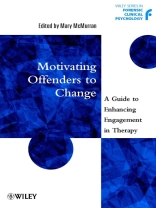There is increasing pressure, soon to be legislation, for particular offenders to be given a choice of psychological treatment or imprisonment, even if treatment must sometimes be within special prison hospitals or units for offenders.
The key issue will be motivating offenders to commit themselves to treatment, and to maintain their motivation trough the therapeutic programme and thereafter, on release.
This is the first book to tackle the subject of motivating offenders in therapeutic programmes and as such, will prove an invaluable resource for forensic practitioners.
* Written by some of the top clinical and forensic practitioners and researchers in offender rehabilitation
* There is a real demand for a book on this subject as a result of changes in criminal justice policy and in mental health provision
Part of the Wiley Series in Forensic Clinical Psychology
İçerik tablosu
Understanding motivation to change
Motivation to change: Selection criterion or treatment need? (Mc Murran)
What is motivation to change? A scientific analysis (Viets et al)
Stages of change in therapy with offenders (Jones)
Motivational enhancement in practice
Enhamcing motivation of offenders at each stage of change and phase of therapy (Prochaska and Levesque)
Building and nurturing a therapeutic alliance with offenders (Cordess)
Motivational interviewing with offenders (Mann et al)
Motivating offenders to change through participatory theatre (Thompson)
Maintaining motivation for change using resources available in an offender’s natural environment (Walters)
Special issues
Ethical issues in motivating offenders to change (Blackburn)
Motivation for what? Effective programmes for motivated offenders (Mc Guire)
Owning your own data: The Management of denial (Laws)
Motivating the unmotivated: Psychopathy, Treatment and Change (Hemphill and Hart)
Motivating Mentally Disordered Offenders (Hodge and Renwick)
Does punishment motivate offenders to change? (Hollin)
Future Directions (Mary Mc Murran)
Yazar hakkında
Dr. Mary Mc Muran is Senior Baxter Research Fellow in the
School of Psychology, Cardiff University, UK, and is funded by the
Department of Health’s National Programme for Forensic Mental
Health Research and Development. She is both a Chartered Clinical
Psychologist and a Chartered Forensic Psychologist, and is a Fellow
of the British Psychological Society. She has worked with offenders
in a young offender’s center, a maximum security psychiatric
hospital, a regional secure unit, and in the community. Over the
years, she has taken a particular interest in alcohol and crime, a
topic on which she has published widely, and in the treatment of
personality disordered offenders. She is the author of several
structured treatment programmes for such offenders, and these are
now widely used in the UK. She is a former Chair of the British
Psychological Society’s Division of Criminological and Legal
Psychology (now the Division of Forensic Psychology), and founding
editor of the journal Legal and Criminological Psychology.












